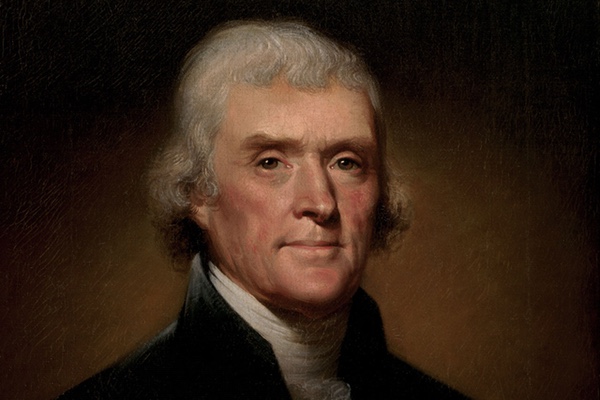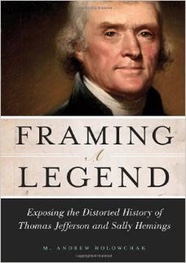As We Head into the GOP Debate, Here's a Question from Jefferson: Are We Voters Up to His Demanding Standards of Virtue?

In his Politics (III.4), Aristotle addresses the bristly problem of shaping citizens to constitutions. The number of constitutions, given the difficulties of accommodating citizens to settings, is many and the number of citizens is, of course, abundant. He approaches the difficulty via analogy: Citizens are to their constitution as are sailors to their ship.
 There
are many different functions for sailors on a ship (rowing, steering,
cooking, and cleaning, etc.)—each requiring a different excellence
(aretē). Yet for a ship to function as a ship—for it to
reach safely its destination—each sailor must share a common
excellence—the safe sailing of the ship. It is the same with
constitutions. “The excellence of each citizen must be suited to
his constitution (politeia),” and since constitutions, like
ships, are many, the excellence of all citizens as good citizens in
one constitution will be different from the excellence of all
citizens as good citizens in another (e.g., in government by one
versus government by all).
There
are many different functions for sailors on a ship (rowing, steering,
cooking, and cleaning, etc.)—each requiring a different excellence
(aretē). Yet for a ship to function as a ship—for it to
reach safely its destination—each sailor must share a common
excellence—the safe sailing of the ship. It is the same with
constitutions. “The excellence of each citizen must be suited to
his constitution (politeia),” and since constitutions, like
ships, are many, the excellence of all citizens as good citizens in
one constitution will be different from the excellence of all
citizens as good citizens in another (e.g., in government by one
versus government by all).
At least as much as any philosopher of his day, Aristotle was acutely cognizant of the hefty problem of shaping persons to city-states—a problem exacerbated by persons being shaped as well by climate and locale. Moreover, constitutions were framed to cultivate good citizens, not good men—the majority, vulgar, being thought incapable of virtue.
The difficulty of fitting persons to constitutions is in one sense mitigated and in another sense decupled for us today. That is best seen in the political philosophy of Thomas Jefferson.
On the one hand, Jefferson, believing all men were by nature free and morally equal, was not an adherent of constitutional pluralism as was Aristotle and, in Jefferson’s day, Montesquieu. So, the task of fitting citizens with a constitution was in some sense, at least theoretically, simpler.
On the other hand, since he believed all men were by nature free and morally equal, it was for Jefferson a matter of constitutions being molded to citizens, not the converse, as it was for Aristotle and numerous others, like John Adams, of Jefferson’s day. Said Adams in Discourses on Davila: “Happiness, whether in despotism or democracy, whether in slavery or liberty, can never be found without virtue. The best republics will be virtuous, and have been so; but we may hazard a conjecture, that the virtues have been the effect of the well ordered constitution, rather than the cause.” For Jefferson, there was need of molding a basic, invariant republican schema in which to fit a constitution to ensure protection of citizens’ rights and create an atmosphere for human thriving—viz., to preserve human virtue. With that axial schema in place, legislators as representatives of citizens’ interests could then craft a constitution with laws that were representative of citizens’ needs and wants at a given time. With each new generation, all citizens could assume some share of legislating by reconfiguring their constitution at a convention. Need of constitutional change was required by changes in citizens’ needs and wants given their assimilation of moral, political, and scientific advances of the day—moral and political being subsumable under scientific.
Jefferson’s belief in molding constitutions to citizens is not a simple alteration of perspective; it is a sea-change, generated by wholesale reconsideration, characteristic of much of Enlightenment thinking, guided by neo-stoicism, of the nature of humans and their role in the cosmos. Jefferson, at the forefront of a revolution in political philosophy, is offering a republicanized and naturalized notion of aristoi (Greek for best, pl.[best men, implied]), based on the moral equality and freedom of all humans.
That notion is best expressed in an important letter to John Adams (October 28 Oct. 1813). Here he maintains, pace Adams (who argued that aristoi would always entail wealth and birth), that there exists a natural aristoi comprising the virtuous and talented, and an artificial aristoi, comprising the wealthy and wellborn. Lack of virtue and talent, coupled with wealth or birth, place one among the artificial aristoi, and disqualify one from governing. The wealthy and wellborn might have certain conveniences or resources that those non-wealthy and non-well-born do not have—viz., they might be better enabled to pursue virtue and to develop their talent, if they should so choose—but those conveniences themselves nowise make them any better suited for good governing.
Jefferson continues in the letter to Adams: “The natural aristocracy I consider as the most precious gift of nature, for the instruction, the trusts, and government of society. … May we not even say, that that form of government is the best, which provides the most effectually for a pure selection of these natural aristoi into the offices of government?” The artificial aristocracy, he adds, is a “mischievous ingredient in government.”
Jefferson’s definition of aristoi is an effort to advance a notion of republicanism to fit his progressivist political thinking. This notion of republicanism is, however, not a political agenda; it is a moral undertaking. He realizes that the people can govern themselves only to such an extent. As members of a county, state, and a federation of states, there are non-parochial concerns that influence them—e.g., security of their rights, foreign affairs, and the behavior of elected officials. For non-parochial concerns, they must have trustworthy and caring governors and officials. The best way to ensure that is to create a schema of government which most guarantees only the true best, the natural aristoi, will be enticed to govern. Only the natural best, with an eye to the good of the whole, will prorogue their own interests to be responsive to the needs and concerns of the general citizenry.
Jefferson’s republicanized notion of aristoi makes demands on social structuring to ensure that those governing are to be among the true “best.” First, all citizens have to be full participants in governing, if only at the level of wards. For example, voting for and overseeing governors and participation as jurors are important citizenly functions. Second, governing has to be laissez-faire, thereby leaving “pursuit of happiness” to the citizens, not to those governing. Third, there must be elimination of any laws that perpetuate a distinct division of the wealthy and wellborn from the general citizenry—e.g., elimination of entails and primogeniture, as well as of state sanction of any religion. Finally and somewhat paradoxically, maximization of liberty involves some “encroachment” in citizens’ affairs.
For citizens to flourish—for all to pursue their own conception of happiness—government must at times act to create opportunities for flourishing (e.g., building roads and clearing rivers). The most important “encroachment” concerns wholesale educational reform. Jefferson hoped that a system of education would be put into place so that each citizen could be educated in pursuance of his needs: The wards schools would give all citizens a basic education to manage independently their own affairs, the grammar schools or “colleges” would function as conduits between ward schools and universities, and any university could prepare its students to be true aristoi through useful, secular education, designed to hone the talents of and cultivate virtue in the youth.
Jefferson’s notion of republican government, an avant-garde idea for his day, was a radical attempt to make meaningless the distinction between the “artificial aristoi”—the wealthy and wellborn—and the people. Jefferson rejected the notion of betterment through birth and aimed to mitigate differences in wealth through social reforms. He writes to Edmund Pendleton (26 Aug. 1776): “My observations do not enable me to say I think integrity the characteristic of wealth. In general I believe the decisions of the people, in a body, will be more honest and more disinterested than those of wealthy men.” Such mitigation aimed to allow for differences in wealth, but those were to be determined through industry and intelligence, not rank, and those divisions were not to be such that they would create divisions among the people. Jeffersonian republicanism was so avant-garde because it was a political and philosophical investment in the good judgment and virtue of the people—an experiment or great experiment as he often called it. Yet his choice of “experiment”betrays the undergirding sentiment that it is not so much unconditional trust in the people that he has, but instead that the days of allowing the wealthy and wellborn to rule have passed and it is time to try something different.